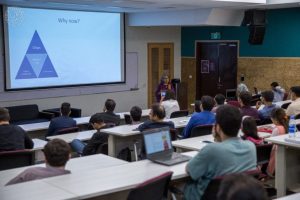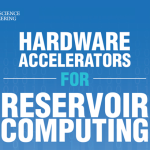Dr. Saleha Raza completed her Ph.D. from the Institute of Business Administration (IBA) in Karachi. She was an enthusiastic member of the Artificial Intelligence Lab in IBA. Currently she is the assistant professor of Computer Science at Habib University. During … Continue reading →
Read More11th October 2019, at Tariq Rafi Hall, Habib University in Karachi, a panel discussion on the Internet of Things (IoT) was arranged through the collaboration of the IoT company Linked Things and the Habib DSSE program. Linked Things CEO Sophia Hasnain, an Embedded Systems engineer, was present, along with the managing Director of RapidCompute, Imran Khan. The program managers at IBM, Jawwad Paracha and Shehzad Khan of Nokia, who joined through video call, were as there as representatives from the industry. The discussion aimed to discuss the prospects of innovation in emerging markets for IoT and how students can take part in the revolutionary process it is enabling.

Ms. Sophia Hasnain, founder and CEO of Linked Things
The event opened with Sophia Hasnain, introducing the technology of IoT. She elaborated on the progress being made in Embedded Systems as a result of advancement in Internet of Things, which has the potential to further knowledge expansion in information technology. She presented an illustrative example of the possibility of highly efficient machine learning, which would mean that what took humans ages to learn could be covered much faster by computer information processing. This implies that future leaps in technological innovation and improvement of life will not only be larger than ever but will also occur at shorter distances.
Ms. Hasnain also discussed Linked Things’s role in developing IoT for emerging markets. The practical uses of IoT in current markets are most commonly understood in its household applications, such as the easy accessibility of light and temperature control through smart devices. She expressed her critique, saying that the focus has to move ahead to more complex systems in a vast arena of fields. Her company has worked for technological innovation in the agricultural and power sectors. According to her, Internet of Things can help solve national-level issues like addressing the need for energy efficiency and problems in areas of environmental, health and safety (EHS).
Imran Khan of RapidCompute took to the stage next and delivered an engaging dialogue on the compatibility of cloud computing and IoT. He highlighted that the 5th Industrial Revolution was to be driven by three major technological advancements, which are IoT, cloud computing, and artificial intelligence. Where IoT comes in, cloud computing follows because the former specializes in the aggregation of a large number of data, and this data is stored in clouds. Mr. Khan introduced RapidCompute as one of the pioneer local cloud computing companies that was conceived to produce technology within the country. This, he emphasized, was his main point to the academic members of universities, that the generation of revolutionary technology through the use of local talent and resources is the key to success for Pakistan. Instead of importing technology, we should be setting sights on a stage where we are self-sustainable and the exporters ourselves.
The panel of speakers was set, with Dr Moiz Anis, engineering faculty at Habib as the moderator. Jawwad Paracha of IBM was first asked to comment, and he gave a compelling insight into a futuristic world under the magic of IoT innovation, where we will find things talking to things. The Nokia representative, Shehzad Khan, remarked on IoT’s connectivity and analytics feature, and then the audience was invited to participate. Questions were posed about the social implications of a machine world and also about work prospects in the professional market for students interested in IoT. Ms. Hasnain and Mr. Khan shared the view that opportunities will be available to keen, passionate engineers and that they are always trying to hold discussions like this one with academic bodies to help raise a technologically skilled body of graduates. For this very purpose, a technical skills workshop for students had been planned for the day after the panel discussion, which was what people looked forward to as the panel disassembled.








